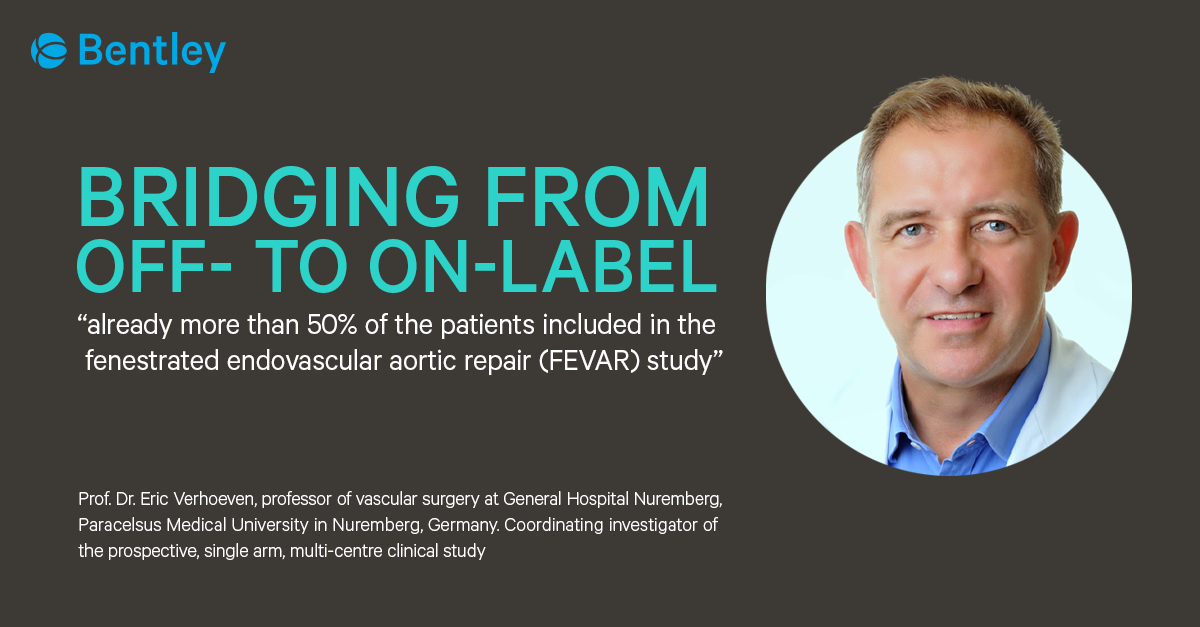NEWS

Over half of patient recruitment already complete for the FEVAR study with Bentley bridging stent
On-label use of the Bentley (Bentley InnoMed, Hechingen, Germany) BeGraft peripheral balloon expandable covered stent in complex aortic aneurysms is a step closer with more than 50 patients now enrolled into the fenestrated endovascular aortic repair (FEVAR) study, which is designed to provide clinical evidence for on-label use in this indication.
The study aims to investigate the safety and performance of the BeGraft peripheral Stent Graft System as the dedicated bridging stent in FEVAR procedures for complex aortic aneurysms.
If data are forthcoming, Bentley aims to be the first company to apply for on-label approval of the BeGraft stent as a bridging stent in FEVAR, and shift from off-label to on-label use in complex aortic aneurysms.
Coordinating investigator and study lead, Professor Eric Verhoeven, Professor of Vascular Surgery at the General Hospital Nuremberg, Paracelsus Medical University, Nuremberg, Germany, remarked:
“Recruitment has been excellent so far. Study investigators and patients have grasped the opportunity to help build an evidence base to support use of this intervention. To date, over 50 patients have been recruited from nine centres across Germany. If we continue at this pace, we are confident that we will complete patient enrolment in the first quarter of the coming year.” said Professor Verhoeven.
“The Bentley BeGraft stent fills an unmet medical need in the treatment of complex aortic aneurysms,” said Professor Verhoeven. “FEVAR is currently a well-established, minimally-invasive option for people with abdominal aortic aneurysms who are not eligible for a traditional endovascular aortic aneurysm repair (EVAR), but the usage of the bridging stents have always been done off-label in these procedures.”
Christian Bader, Director of Quality & Market Access at Bentley is pleased about the speed of progress with patient recruitment for the study, and says: “We look forward to being able to offer an on-label solution for this important area of application after approval.”
Eventually, a complete cohort of 100 patients will be included to generate data on approximately 250-300 BeGrafts in fenestrations. Recruitment should be completed in the first quarter of 2022 with 24 months of follow-up.
Participating centres in the study include Nuremberg, Munster, Munich, Hamburg, Regensburg, Aachen, Stuttgart, Freiburg, and Giessen, all in Germany. To date, the majority of patients have been treated in Nuremberg by Professor Verhoeven, and by Professor Nikolaos Tsilimparis at Klinikum der Universität München (LMU).
The main outcomes will be technical success (successful introduction and deployment), bridging stent patency at 12 months, as well as the absence of procedure-related complications and bridging stent-related endoleaks at 12 months. Overall clinical outcomes including 30-day mortality, and health-related quality of life will also be assessed alongside adverse events.
The Foundation for Cardiovascular Research and Education (FCRE) is conducting the study, which is approved by the German competent authority BfArM, in collaboration with Bentley.
ClinicalTrials.gov Identifier: NCT03987035
FCRE is also conducting a prospective, single arm, multi-centre clinical study in collaboration with Bentley to obtain an indication for the use of the BeGraft peripheral PLUS Stent Graft System as a bridging stent in branched endovascular aortic repair (BEVAR) for the treatment of complex thoraco-abdominal aortic aneurysms. This trial began in September 2020 and also aims to carry out 100 BEVAR procedures with an average of 2.5 bridging stents per procedure.
ClinicalTrials.gov Identifier: NCT03982940